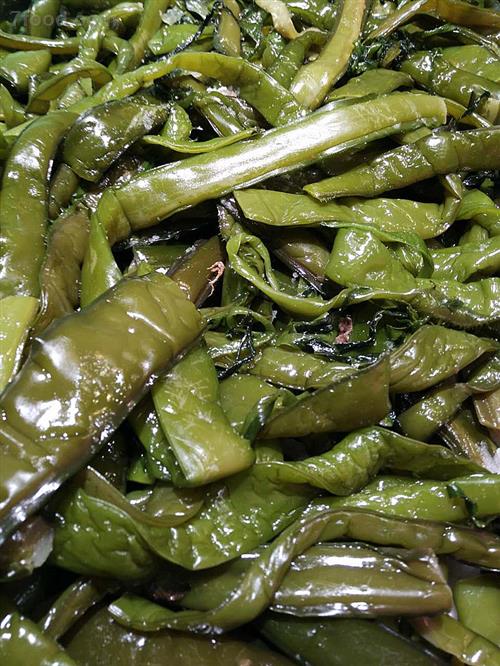Kelp is a common marine vegetable, which is also known as Khumbu and Jiangcai. It has high food value and has a certain medicinal value. There are many ways to eat kelp, salad, stew, cooking, frying, etc., low in calories, rich in mineral content, the following Xiao Bian will take you to understand more edible benefits and related precautions. Hyperthyroidism can not eat kelp Kelp is an alias: Khumbu, called “Kunbu†when it was used as a medicine, has a name of “the crown of alkaline foodâ€. Medicinal cold, salty water can be soft, breaking the product to wet. For tumors, fistulas; for hernia, testicular cysts; for edema, athlete's foot. In addition, modern is also used for hypertension, coronary heart disease, tumors and so on. However, hyperthyroidism patients can not eat foods and drugs containing more iodine, such as kelp, seaweed, seafood and other seafood products and Huang Yaozi, kelp, Prunella, seaweed and other drugs. Therefore, we cannot eat kelp. Tips: For patients with hyperthyroidism, you must not erroneously eat foods that are not good for you. Usually should stay away from foods containing more iodine. Who can not eat kelp Hyperthyroidism, pregnancy, stomach cold, gastroenteritis patients should not eat. 1, pregnant women and nursing mothers do not eat more kelp. This is because the iodine in kelp can enter the fetus and infants with the blood circulation, causing thyroid dysfunction. 2, patients with hyperthyroidism do not eat kelp, due to the rich content of iodine in kelp, will increase the condition. Therefore, when eating kelp, we must pay attention to the above content. In addition, kelp should not be eaten too much at one time. Excessive eating of kelp may cause stomach injury. The applicable population of kelp suitable for majority of the people. Especially suitable for iodine deficiency, goiter, hypertension, hyperlipidemia, coronary heart disease, diabetes, arteriosclerosis, osteoporosis, malnutrition anemia and hair thinning and cirrhosis of ascites and neurasthenia. Food taboos for kelp 1, Do not eat kelp as a staple food Can not be used as a staple food for a long time, so too much iodine intake will also have an impact on health. Moreover, a certain amount of arsenic is contained in kelp, and excessive intake of arsenic can cause poisoning. Therefore, before eating kelp, rinse with water to dissolve arsenic. 2, kelp can not be soaked for a long time Before seaweed eat, do not soak for a long time. Because the soaking time is too long, the nutrients in the seaweed, such as water-soluble vitamins and inorganic salts, will also dissolve in the water, and the nutritional value will be reduced. If seaweed is boiled like water after soaking in water, it means that it has deteriorated and can no longer be eaten. Chinese medicine believes that kelp is cold, and those with spleen and stomach deficiency should not eat. 3, do not drink tea immediately after eating kelp, eat fruit Do not drink tea immediately after eating kelp, and do not eat sour fruit immediately. Because kelp is rich in iron, both of these foods will hinder the absorption of iron in the body. The effectiveness and role of kelp Lipid-lowering blood pressure Kelp is rich in taurine. Taurocholic acid combined with bile can increase the solubility of fat and cholesterol and reduce cholesterol in blood and bile. At the same time, taurine can inhibit platelet aggregation and reduce blood lipids and blood. In the cholesterol content, which play a role in lowering blood lipids and blood pressure. Diuretic swelling A layer of white powder such as mannitol is attached to the surface of kelp. It is a good medicinal substance. Medically used as a diuretic, it is also used to reduce intracranial pressure and intraocular pressure. Breast disease prevention Iodine has a good effect on the prevention and improvement of breast hyperplasia. It can reduce estrogen levels in the body, regulate endocrine secretion, and restore normal ovarian function. Kelp contains high levels of iodine, and regular consumption of kelp can help prevent and treat hyperplasia of the breast. Hypoglycemic Kelp polysaccharides and alginate oligosaccharides in seaweed are high quality dietary fibers that promote gastrointestinal motility and reduce the absorption of harmful substances and cholesterol. Fucoidan also promotes insulin secretion. Diabetic patients do not have to worry about elevated blood sugar after eating. Can also alleviate the condition of diabetes. Prevention of cardiovascular diseases Kelp is rich in unsaturated fatty acids and dietary fiber, they can remove cholesterol in the blood vessel wall, lower blood low density protein cholesterol, improve blood vessel wall elasticity, prevent thrombosis, so as to achieve prevention of cardiovascular and cerebrovascular diseases. Prevention of goiter Iodine is an important trace element in the synthesis of thyroid in the human body. If long-term iodine deficiency can lead to endemic goiter or small disease, regular consumption of kelp can prevent the disease from occurring. Keep warm Kelp is rich in calcium, iron and other trace elements can improve the body's ability to resist cold, in winter, more appropriate to eat more kelp can play a role in keeping warm and prevent colds. Detoxification hair care Kelp is similar to hair. Regular consumption of seaweed not only supplements the body's nutrients but also makes the hair moist and shiny. In addition, kelp is rich in dietary fiber, which promotes intestinal excretion, speeds up metabolism, and prevents excess energy from turning into fat accumulation under the skin. Therefore, eating more kelp can also lose weight. Digital Camera,Walkie Talkie Interact,Walkie Talkie,Kids Camera Shenzhen Zuomi Technology Co., Ltd. , https://www.zuomicamera.com
Who can not eat kelp?
